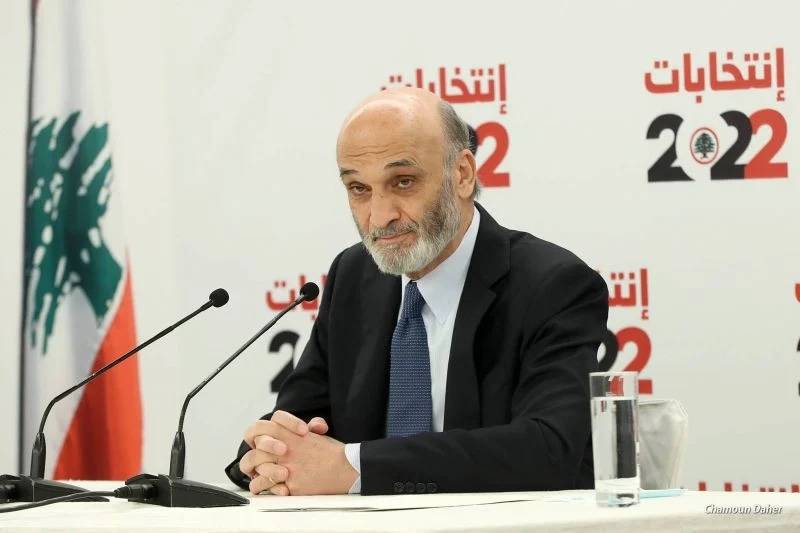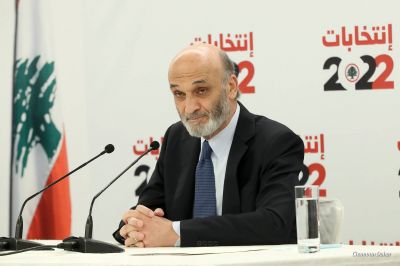
Lebanese Forces leader Samir Geagea in Meerab. (Credit: Chamoun Daher)
Anyone who has been following up closely on the Lebanese Forces’ program knows that the political party has been preparing for the 2022 polls since May 7, 2018 — the day after the election results were out.
The LF has a better organizational capacity than any other Lebanese party in the country, with the exception of Hezbollah. It can also rely on a stable and disciplined electorate.
Back in 2018, the LF almost doubled their parliamentary seats (from eight to 15), benefiting in particular from an electoral law that played to its advantage.
But for the LF leader, Samir Geagea, it’s now time to think bigger.
Having taken center stage especially after the Oct. 14 clashes in Beirut’s Tayyouneh district between Hezbollah and Amal supporters on one side and armed men allegedly belonging to the LF on the other, Geagea is confident to say in private circles that he is aiming for at least 20 seats, including 17 for Christians and several other seats for Sunnis.
There is no other traditional party in the country that is impatiently waiting for the May 15 polls as much as the LF. For Geagea’s party, the elections are a key objective to rise to power and to assert itself as a leading Christian force, particularly in view of the presidential election later in the year.
During the Oct. 17, 2019, popular uprising, Geagea changed strategy. His ministers resigned on Oct. 20 of the same year before then Prime Minister Saad Hariri stepped down. He has since presented himself as the spearhead of the opposition, while the vast majority of civil society movements consider the LF to be another traditional party and refuse to forge any alliance with it.
Within the Christian electorate, the LF is criticized for having taken part in the 2016 presidential compromise, which saw Michel Aoun ascending to the presidency, and of having “shared” the cake with the other political parties in cabinet and administrative appointments.
“The reconciliation with Aoun (in reference to the Maarab agreement of January 2016) had a long-term objective, which is to consolidate the principle of a strong Christianity,” an LF senior party official told L’Orient-Le Jour.
Despite its faltered partnership with the Free Patriotic Movement, and the party’s harsh criticism of its leader Gebran Bassil and President Aoun, both accused of having led the country to ruin because of their alliance with Hezbollah, the LF continues to defend the Maarab agreement.
“Christian wounds had to be healed,” a close associate of Geagea said in reference to the fierce fighting between the Lebanese Army led by Aoun, then army commander, against the LF in the final years of the 1975-90 Civil War.
Hezbollah and the FPM in a weak position
The various LF officials interviewed by L’Orient-Le Jour seem convinced that their electorate will not hold these choices against the party in the legislative elections.
All the energy is mobilized in the battle that promises to be rather favorable for the Christian party, which has been fervently calling for early elections since the Oct. 17 uprising.
“Hezbollah and the FPM are in a weak position and will seek to delay the elections,” Geagea’s close associate, adding that the party leader has asked the embassies to pressure Hezbollah not to prevent the elections from taking place.
“Gebran Bassil fears the votes of the Lebanese living abroad, which is why he is trying to obstruct the elections. He is proposing to extend the mandate of the current Parliament in exchange for that of the president, but won’t let him have it his way,” another party official said.
The FPM wants the Lebanese expatriate vote to be limited to a single constituency, the 16th, which would allow them to cast their ballot for six MPs (representing the six continents) in addition to the 128 deputies that currently make up Parliament, as initially provided in the 2017 electoral law.
Aoun’s term in office expires in October. In November 2021, the president said he would not leave his position without his successor being elected, but he then reneged on his remarks, claiming a right to have a say in the selection of a future presidential candidate.
But if the LF manages to secure more seats than the FPM, it would have the upper hand in the choice of the future president. Geagea’s party has what it takes to make a breakthrough and to benefit from its rival’s declining popularity.
To this end, however, the LF must also forge new alliances, to compensate for the loss of the support of Hariri who recently announced his withdrawal from political life.
In addition to the FPM, the LF will have to face off, in almost all constituencies, against the Kataeb and movements from civil society.
“We have other alliances, such as our alliance with the Progressive Socialist Party (of Walid Joumblatt) and other local allies, including political figures who have a clear sovereigntist project aimed at restoring the balance [of power] in the country,” a senior LF official said, naming Camille Dory Chamoun among his party’s allies in Baabda.
The LF appears to be planning on filling the vacuum left by Hariri’s withdrawal and is focusing on the Sunni electorate.
“We are coordinating with many personalities, including former Prime Minister Fouad Siniora and former MPs from Saad Hariri’s party,” the source said, adding that things will become clearer in the coming period.
The Future Movement, but also the FPM, accuse the LF of having betrayed Hariri in order to win over the Sunni voices that are most hostile to Hezbollah.
Ties between the LF and Hariri’s party are at all-time low, so much so that the LF accused the former premier of “having directed his supporters” to mobilize in a bid to prevent the LF from getting “any Sunni votes.”
The row between the two sides can also be linked to Saudi Arabia’s decision to boycott the Sunni leader and make the LF its main ally in Lebanon.
“We do not uphold a Saudi project in Lebanon, but we believe it is not possible to be confrontational with the Arab countries and in the need to maintain good relations with them as they are the only countries that can help Lebanon,” Geagea’s close associate said.
Other political parties often accuse the LF of being financed by Saudi Arabia and of adapting its politics according to Riyadh’s interests.
‘Causing a breach’
While many pundits doubt the possibility that the elections could be a game-changer in Lebanon, the LF believes the polls are a decisive step.
“Even without a majority in Parliament, we can galvanize a group of deputies into imposing our will,” Geagea’s close associate, who is betting on alliances with independent figures, said.
“The main goal of the elections is to cause a small breach and prove to citizens that change is possible,” the source added.
According to its calculations, the LF will emerge as the largest Christian party in Parliament on May 15.
“Even with this, Samir Geagea is well aware that he will not be president,” the source close to him said.
Hezbollah and the Syrian regime would never allow it.
This article was originally published in French in L'Orient-Le Jour. Translation by Sahar Ghoussoub.
